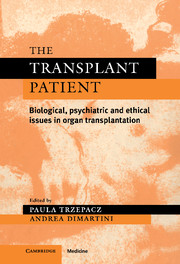Book contents
- Frontmatter
- Contents
- List of contributors
- Preface
- 1 The mystique of transplantation: biologic and psychiatric considerations
- 2 Psychosocial screening and selection of candidates for organ transplantation
- 3 Psychosocial issues in living organ donation
- 4 Quality of life in organ transplantation: effects on adult recipients and their families
- 5 Quality of life of geriatric patients following transplantation: short- and long-term outcomes
- 6 Cognitive assessment in organ transplantation
- 7 Pharmacologic issues in organ transplantation: psychopharmacology and neuropsychiatric medication side effects
- 8 Alcoholism and organ transplantation
- 9 Ethics and images in organ transplantation
- 10 Psychoneuroimmunology and organ transplantation: theory and practice
- 11 Pediatric transplantation
- 12 Current trends and new developments in transplantation
- Index
11 - Pediatric transplantation
Published online by Cambridge University Press: 14 September 2009
- Frontmatter
- Contents
- List of contributors
- Preface
- 1 The mystique of transplantation: biologic and psychiatric considerations
- 2 Psychosocial screening and selection of candidates for organ transplantation
- 3 Psychosocial issues in living organ donation
- 4 Quality of life in organ transplantation: effects on adult recipients and their families
- 5 Quality of life of geriatric patients following transplantation: short- and long-term outcomes
- 6 Cognitive assessment in organ transplantation
- 7 Pharmacologic issues in organ transplantation: psychopharmacology and neuropsychiatric medication side effects
- 8 Alcoholism and organ transplantation
- 9 Ethics and images in organ transplantation
- 10 Psychoneuroimmunology and organ transplantation: theory and practice
- 11 Pediatric transplantation
- 12 Current trends and new developments in transplantation
- Index
Summary
Introduction
Pediatric recipients of organ transplants and their families present a variety of psychological and ethical challenges to transplant teams and the psychologists and psychiatrists who work with them. Some of these are relatively similar to those of adult patients, but others differ in significant ways. For example, a primary difference between adult and pediatric transplants is that the majority of organ transplantation done in children is for congenital disorders such as biliary atresia or cardiac malformations (Fox and Swazey 1992). This means that the recipients are often very young, and require an adult, usually a parent, to act as the decision maker. Congenital illnesses also mean that the child has been chronically ill, often without an experience of normal development, and sometimes with quite delayed development. A third implication of a congenital illness is that it is not acquired by the patient, and thus is not subject to the recrimination about causation or concern for recurrence frequently raised by organ damage secondary to alcohol use, cigarette smoking, or diet, and often seen in the adult population (Craven and Rodin 1992).
These areas of difference between adult and pediatric organ transplantation will be the focus of the first part of this chapter: the unique epidemiology, role of the family, issues of development, and responses of staff for pediatric organ transplant recipients.
- Type
- Chapter
- Information
- The Transplant PatientBiological, Psychiatric and Ethical Issues in Organ Transplantation, pp. 275 - 286Publisher: Cambridge University PressPrint publication year: 2000
- 1
- Cited by

